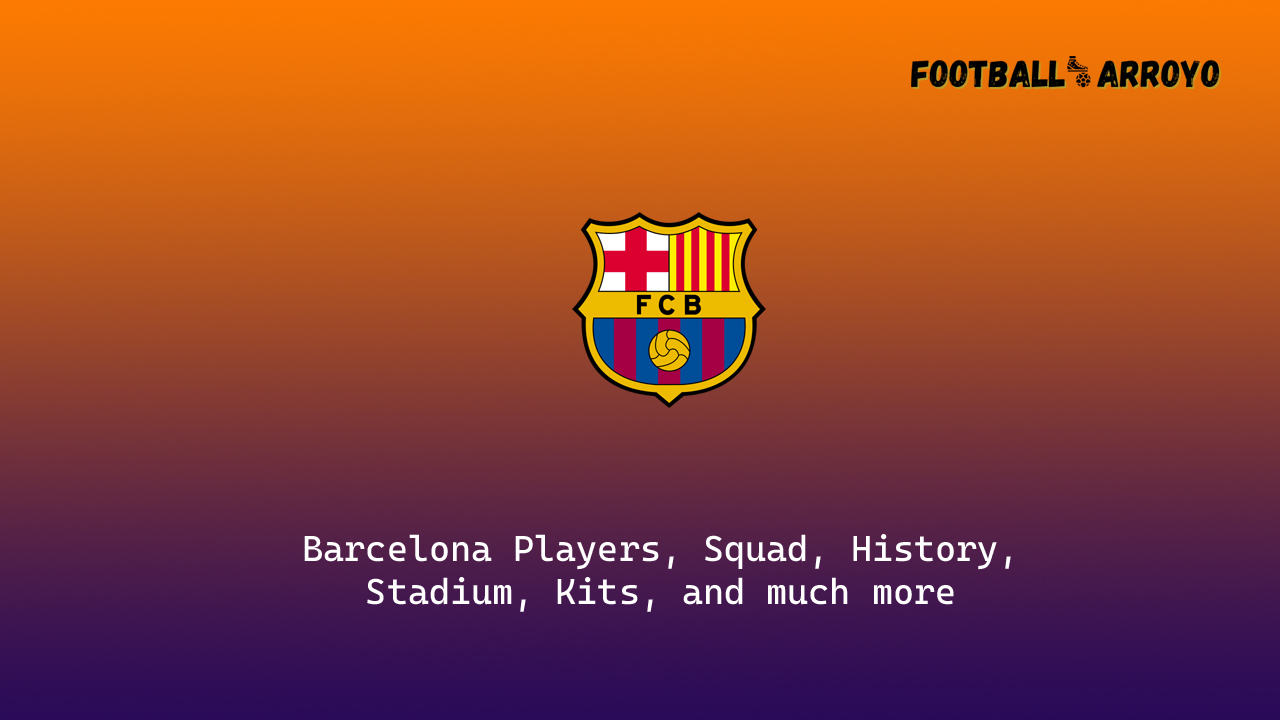Futbol Club Barcelona commonly referred to as Barcelona and colloquially known as Barça, is a professional football club based in Barcelona, Catalonia, Spain, that competes in La Liga, the top flight of Spanish football.
Founded in 1899 by a group of Swiss, Catalan, German and English footballers led by Joan Gamper, the club has become a symbol of Catalan culture and Catalanism, hence the motto “Més que un club” (“More than a club”).
Unlike many other football clubs, Barcelona is owned and operated by fans. It is the fourth most valuable sports team in the world, with a value of 4.76 billion dollars, and the fourth richest football club in the world in terms of income, with an annual turnover of 582.1 million euros. The official anthem of Barcelona is the “Cant del Barça”, written by Jaume Picas and Josep Maria Espinàs. Barcelona traditionally plays in dark shades of blue and maroon stripes, hence the nickname Blaugrana.
At the national level, Barcelona has won a record 75 trophies: 26 La Liga, 31 Copa del Rey, thirteen Spanish Super Cups, three Eva Duarte Cups, and two League Cup titles, as well as being the record holder for the last four competitions. In international club football, the club has won 22 European and world titles: five UEFA Champions League titles, a record four UEFA Cup Winners’ Cups, a joint record five UEFA Super Cups, a record three Inter-Cities Fairs Cups, a joint record two Latin Cups and three FIFA Club World Cups.
Barcelona ranked first in the International Federation of Football History and Statistics world club rankings in 1997, 2009, 2011, 2012, and 2015, and is sixth in the UEFA club rankings as of July 2022. The club has a long-standing rivalry. with Real Madrid, and the matches between both teams are called El Clásico.
In this article, you will get to know about Barcelona 2023/24 Players, Squad, History, Stadium, Nickname, Kits, and more.
Barcelona Profile Summary

- Full name: Futbol Club Barcelona
- Nickname: Barça or Blaugrana (team) Culers or Barcelonistes (supporters) Blaugranes or Azulgranas (supporters)
- Founded: 29 November 1899; 122 years ago as Foot-Ball Club Barcelona
- League: La Liga
- Head coach: Xavi
- Stadium: Camp Nou Estadi Olímpic Lluís Companys
- Website: Club website
2008-20. The best years in our history
Barça delight the world with their brand of football that is appreciated by football fans from all over the world. They win three more Champions League titles in a decade of dominance for the blaugranes
From the season 2008/09 under Josep Guardiola, the team improved even further. Playing with the same style that Cruyff had introduced, Guardiola was a firm supporter of basing his team around the club’s own youth system and promoted several young talents to the first team, and the result was the greatest Barça team ever.
The greatest international recognition of this came when the FIFA Ballon d’Or nominations in 2010 shortlisted Xavi, Iniesta and Messi for the honour, all three of whom had grown up at La Masia, the residence where young sportspeople of all ages are trained and educated.
This team was the culmination of everything that FC Barcelona stands for, and produced an amazing string of major titles, including two Champions Leagues and three Spanish Leagues, plus the long-awaited Clubs World Cup, which was finally won in 2009, that extraordinary year when Barcelona won all six major trophies, something unprecedented in the history of European football.
Barça broke all kinds of records, played memorable matches and won just about every title on offer. But the finest hour for Guardiola’s side came at Wembley on 28 May, 2011, when the world was enchanted by the kind of football that dreams are made of. The world’s press bestowed praise on this extraordinary side that had written one of the most incredible chapters in the history of the game.
The Guardiola era ended in 2012 but Barça continued their success under Tito Vilanova (the league in 2012/13) and Luis Enrique who in 2015 won the Champions League, the League and the Copa del Rey in another historic treble winning season.
But it wasn’t just the football team that was collecting honours. The basketball, handball, futsal and roller hockey teams also won further European titles. Furthermore, the season 2011/12 and 2014/15 ended with a new record by winning 17 professional titles. Never before had FC Barcelona won so much silverware in a single season during its 118 year history.
THE RETURN OF GUARDIOLA
In 2008, Josep Guardiola accepted the difficult job of replacing Frank Rijkaard as coach and end a run of two seasons without a trophy. To do so, he applied the same style of play that was used when he was a player at the Club, an attacking philosophy based on passing and it turned out to be a great success.
In his debut season, Guardiola won all three trophies available. After a winning start to the following campaign in 2009/10, Barça became the team of the Six Trophies, all won in the calendar year of 2009. The run of success continued with Guardiola claiming 14 titles of a possible 19 as coach in his four seasons in charge. Guardiola became a reference point in football and his Barça side went beyond the strictly footballing field.
BARÇA WIN THEIR THIRD CHAMPIONS LEAGUE
FC Barcelona went to the Olympic Stadium looking to claim their third title of the season after having won the Copa del Rey and the league. Guardiola went into the final against Manchester United with several players missing in defence. The Premier League side started strongly but Eto’o’s goal changed the game and from then on Barça dominated with Messi adding a second to make the final score 2-0. On 27 May 2009 Barça claimed their third Champions League title thanks to victory over the holders, becoming the first Spanish side to claim the treble of the Copa del Rey, the league and the Champions League.
2009, A MAGICAL YEAR
Under the direction of Josep Guardiola, the team had a dream 12 months, winning every trophy possible. Six titles that they claimed with authority, Barça on the field were untouchable. At the end of the season there were celebrations and the trophies kept coming for the rest of the year.
13 May – Copa del Rey
16 May – League
27 May – Champions League
23 August – Spanish Super Cup
28 August – European Super Cup
19 December – FIFA World Club Cup
SANDRO ROSELL, NEW PRESIDENT
Sandro Rosell rose to the presidency of FC Barcelona with an extensive background in both the business world and in football. His first stint in the management of the Club had begun in 2003 as a member of the board under then-president Joan Laporta. Rosell was the driving force behind the signing of Ronaldinho.
Rosell’s candidacy used the slogan “We are all Barça” under an electoral program created after listening to the members for two years. In 2010 he was elected the new president of FC Barcelona with an overwhelmingly successful 35,021 of the votes, the best result ever achieved. Sandro Rosell thus became the most voted president in the history of the Club.
BARÇA SWEEP THE PODIUM FOR THE BALLON D’OR
FC Barcelona made history with the nomination of Xavi, Iniesta and Messi as finalists for the FIFA Ballon d’Or 2010. Three Barça players who all came up through La Masia swept the podium. Journalists, coaches and captains from around the world, the elite of world football, lauded Barça’s style. It was the first time that all three finalists came from the youth academy of the same club. It was a full recognition of the work done at La Masia. Three superstars developed at home, instilled with the values of effort, humility, sportsmanship and enthusiasm, were selected as the three best players in the world in 2010.
WEMBLEY, AGAIN
On 28 May 2011 Barça lifted its fourth European Cup. The victory came at the new Wembley Stadium, the same place where in 1992 Cruyff’s Barça had won the trophy for the first time. It was full of symbolism. After winning a very difficult semi-final against Real Madrid, Barça played for the title against Manchester United, who they had defeated in the Rome final two years before. A clearly superior Barça won 3-1 with goals each striker: Pedro, Messi and Villa.
It was a great display of football, one of the best ever seen in a Champions League final. Europe hailed Barça, and the world press followed suit. At the end of the summer Barça confirmed its greatness by winning the Spanish Super Cup against Real Madrid and UEFA Super Cup against Porto.
THE DEATH OF TITO VILANOVA
One of the saddest pieces of news in Barça history was received on 25 April 2014 when Francesc ‘Tito’ Vilanova i Bayó (Bellcaire d’Empordà, 09/17/1968 – 04/25/2014, Barcelona), a man loved and admired by all, died at the age of 45 after failing to overcome an illness had forced him in July to step away from his duties as head coach of the first team, and just a couple of months after leading the team to a league title with 100 points, a record achievement. Vilanova was also Guardiola’s second in command from 2008 to 2012. A totalof 53,000 people came to Camp Nou in the days after his death to pay him a final tribute.
GOODBYE TO TWO LEGENDS: PUYOL AND VALDÉS
In the summer of 2014, Barça said goodbye to two captains. Two symbols. Carles Puyol, the eternal captain, announced his retirement as a player after 593 official matches and a career that made him an idol for the Barça fans. The most remembered were his defensive stop with the Barça shield in a Champions League match, his kisses to the Senyera in Barça’s 6-2 win at the Bernabéu or when he gave Abidal the honor of lifting the Cup after the victory at Wembley in 2011.
Puyol’s departure coincided with that of Víctor Valdés, the veteran Barça goalkeeper who months earlier had announced his intention to leave the team at the end of the 2013/14 season. One of the best to wear the Blaugrana shirt, Valdés conceded just 441 goals in 535 games. His most notable performances included the 2006 Champions League final in Paris and the semi-final against Chelsea in 2009.
LUIS ENRIQUE: ARRIVAL AND A TREBLE
Gerardo Martino replaced Tito Vilanova in the summer of 2013 but, despite a strong start, left after the 2013/14 season having won only the Spanish Super Cup. Luis Enrique, a beloved former Barça player, took Martino’s place as manager in the summer of 2014 and success came immediately. In his first year as coach, Luis Enrique would achieve the second treble in Barça’s history, just six seasons after the first.
FC Barcelona won the League, the Copa del Rey and the Champions League in a magical season. The same team, made up of top-level players such as Messi, Iniesta, Neymar Jr and Luis Suárez, won a total of five titles in 2015, adding the UEFA Super Cup and the Club World Cup to the treble. To that treble the team would add four more trophies the following season: the European Super Cup, the Club World Cup, the League and the Copa del Rey. In addition, in the 2016/17 season, the team won the Copa del Rey, the third in a row.
XAVI’S FAREWELL
In the summer of 2015, coinciding with the achievement of the second treble, Xavi Hernández announced his goodbye. The legendary FC Barcelona midfielder hung up his shoes after 17 seasons in the first team.
He said goodbye to the Club with an enviable total of 25 titles: eight leagues, four Champions Leagues, three Spanish Cups, six Spanish Super Cups, two European Super Cups, and two Club World Cups. Xavi left with 85 goals in 767 official matches, an FC Barcelona record. He left an inheritance of his unique style of football.
JOSEP MARIA BARTOMEU WINS ELECTION
On July 18, 2015, Josep Maria Bartomeu won the elections for the presidency of FC Barcelona. With 25,823 votes, 54.6% of the total, Bartomeu won the third most voted election in the club’s history. Bartomeu quickly resumed part of the work that he had already started in January 2014, after the resignation of the previous president, Sandro Rosell.
THE ERNESTO VALVERDE ERA
Ernesto Valverde had been a Barça player under Johan Cruyff at Barça and had had a highly successful career as a manager. He took over as coach of Barça in the 2017/18 season and under his leadership a new stage began for FC Barcelona, full of optimism and enthusiasm. In his first season at the helm he won the league and cup double and in the second he won the league and the Spanish Super Cup again.
However, in the 2019/20 season the results were not favorable and he was fired in January 2020. His successor, Quique Setién, arrived at a difficult time in a year marked by the Covid-19 pandemic and left the club in August. 2020.
RONALD KOEMAN ARRIVES
Ronald Koeman became Barça manager in the summer of 2020. The Dutchman had been a Barça player for six seasons between 1989 and 1995 and gained hero status at the Club after scoring the winning goal in the final of the 1992 European Cup, giving the Catalans their first victory. In the competition.
Koeman came to Barça after more than 20 years of coaching at Vitesse, Ajax, Benfica, PSV, Valencia, AZ Alkmaar, Feyenoord, Southampton, Everton, and the Denmark national team.
Barcelona Home Stadium
Camp Nou has been FC Barcelona’s home since it was officially opened on 24 September 1957.

Barça’s new stadium replaced the old Les Corts ground, which with a capacity of just 48,000 spectators was too small to accommodate the interest generated by a team led by Hungarian star Ladislao Kubala.
In December 2021, a record 88% of the club members voted in favor of the Espai Barça project to revamp the club’s sporting facilities, being the first online referendum in FC Barcelona history. Originally projected to have been completed in 2021, it is now aimed to finish by the end of 2025, with an estimated €1.5 billion net funding.

Barcelona Kit
Barcelona released its 2022-23 home jersey on June 3, featuring a bold striped design delivered by suppliers Nike.
The Catalan outfit is famous for its Blaugrana stripes, which have been wide and narrow over the years, while only once, in 2015-16, have they deviated from vertical to horizontal lines. The 2021-22 kit was a slightly lighter color than the last offering, offering a nod to the 1992 Olympics that were held in Barcelona.
Since 1998, the club has had a kit deal with Nike. In 2016, the deal was renewed until 2028 for a record €155 million per year. The contract includes a clause sanctioning penalty or agreement termination anytime if Barcelona fail to qualify for the European competitions or is relegated from La Liga.
Here is Barcelona 2023/24 Kit, Home, Away, and Third Kit, Jersey.
Who are Barcelona players Squad?
FC Barcelona Squad 2022? FC Barcelona First Team 2024? Here we have the full FC Barcelona Squad 2024 list. We have included the squad from previous years too if you want to take a trip down memory lane. But first, we have the FC Barcelona Squad 2024 list.
| NAME | POSITION | AGE | HEIGHT | WEIGHT | NATIONALITY |
|---|---|---|---|---|---|
| Marc-André ter Stegen | G | 31 | 1.88 m | 83 kg | Germany |
| Iñaki Peña | G | 24 | 1.83 m | 78 kg | Spain |
| Ander Astralaga | G | 19 | 1.91 m | 77 kg | Spain |
| Diego Kochen | G | 17 | 1.88 m | — | USA |
Outfield Players
| NAME | POSITION | AGE | HEIGHT | WEIGHT | NATIONALITY |
|---|---|---|---|---|---|
| João Cancelo | D | 29 | 1.83 m | 73 kg | Portugal |
| Alejandro Balde | D | 20 | 1.75 m | 68 kg | Spain |
| Ronald Araújo | D | 24 | 1.88 m | 78 kg | Uruguay |
| Iñigo Martínez | D | 32 | 1.83 m | 76 kg | Spain |
| Andreas Christensen | D | 27 | 1.88 m | 82 kg | Denmark |
| Marcos Alonso | D | 32 | 1.88 m | 83 kg | Spain |
| Sergi Roberto | D | 31 | 1.78 m | 68 kg | Spain |
| Jules Koundé | D | 25 | 1.8 m | 73 kg | France |
| Pau Cubarsí | D | 16 | 1.83 m | — | Spain |
| Hector Fort | D | 17 | 1.75 m | — | Spain |
| Gavi | M | 19 | 1.73 m | 68 kg | Spain |
| Pedri | M | 20 | 1.75 m | 58 kg | Spain |
| Oriol Romeu | M | 32 | 1.83 m | 83 kg | Spain |
| Frenkie de Jong | M | 26 | 1.8 m | 73 kg | Netherlands |
| Ilkay Gündogan | M | 33 | 1.8 m | 78 kg | Germany |
| Ángel Alarcón | M | 19 | 1.75 m | — | Spain |
| Marc Casadó | M | 20 | 1.73 m | 66 kg | Spain |
| Fermín López | M | 20 | 1.75 m | 63 kg | Spain |
| Aleix Garrido | M | 19 | 1.7 m | 63 kg | Spain |
| Unai Hernandez | M | 18 | 1.7 m | 63 kg | Spain |
| Ferran Torres | F | 23 | 1.83 m | 77 kg | Spain |
| Robert Lewandowski | F | 35 | 1.85 m | 81 kg | Poland |
| Raphinha | F | 26 | 1.75 m | 68 kg | Brazil |
| João Félix | F | 24 | 1.8 m | 68 kg | Portugal |
| Lamine Yamal | F | 16 | 1.8 m | — | Spain |
| Pau Victor | F | 21 | 1.83 m | 77 kg | Spain |
| Marc Guiu | F | 17 | 1.88 m | — | Spain |
Who is the Barcelona technical staff?
A list of all Barcelona trophies for the entire club history
FC Barcelona is the most successful club in Spain, having won 75 domestic titles: 26 La Liga, a record 31 Copa del Rey, a record 13 Supercopa de España, a record three Copa Eva Duarte and a record two Copa de la Liga. This article discusses all of Barcelona’s trophies of all time.
Source: FootballArroyo.co.uk

